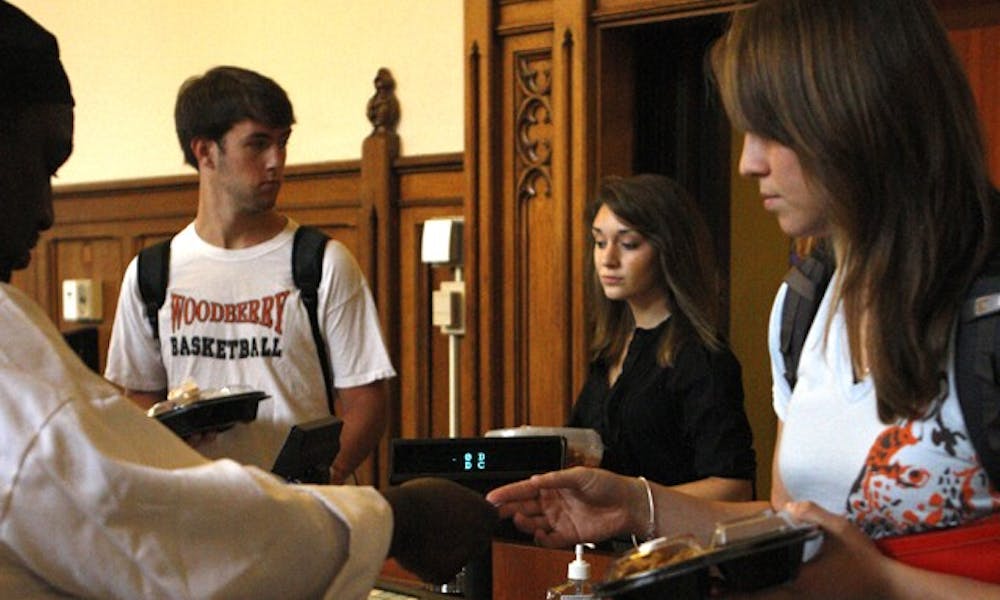Negotiations regarding the overhaul of Duke Dining to reduce the current $2.2 million deficit are still under wraps.
Campus leaders involved in the discussions—including Vice President for Campus Services Kemel Dawkins, Director of Dining Services Jim Wulforst and Duke Student Government President Awa Nur, a senior—met Tuesday to discuss changes but reached no resolution. Adjustments to dining should be finalized this week, Dawkins said. Wulforst declined to comment for this story.
“The deficit is real, and we want to fix it with the least harm to students,” said DSG Chief of Staff Mike Lefevre, a junior. “We don’t want only undergraduates to be hit.”
After the meeting, Nur, Lefevre and sophomore Pete Schork, DSG vice president for athletics and campus services, created a list of student provisions for the administration, including setting an expiration date of one year for any dining changes and eliminating faculty and staff discounts on food.
“We haven’t put any number on a fee or figured out what the entire package will look like, but pending these stipulations, we will consider a variety of proposals,” Lefevre said.
Previous plans to close the gap included “directed choice” and a “freedom tax.” Under directed choice, students would have be required to spend 500 to 700 food points at non-contracted Bon Appétit Management Company vendors, including the Great Hall and the Marketplace. A freedom tax would have charged students a 6 percent tax on food points spent at contracted eateries.
Both plans are now off the table, but changes must still be made because the current dining model is unsustainable, Schork said.
Although alterations to dining have not been finalized, Lefevre said students can expect both internal changes—which will affect faculty and staff—and administrative changes, such as fee increases and food plan changes. Freshmen may experience the most dramatic modifications of all, including fewer food points in each of the plans. The points in the base allocation may decrease to $300 from $370.
Decreasing allotted food points would ideally shift freshmen from eating at contracted eateries to eating more meals at the Marketplace, increasing the amount of funds going to Bon Appétit and Dining.
But Lefevre said such a plan would not alleviate the deficit, and students would continue to eat at contracted locations.
“What would the freshman reaction be? They would hate it,” Lefevre said. “It would be frustrating, but they would cope and in the end, their parents would add more [points].”
Other fee adjustments may include increases in students’ administrative or dining services fees. Student dining plans may also increase in price by 6 percent instead of the annual 3 percent increase, although the amount of food points received would not change, Nur said.
Nur added that with more than 40 percent of students currently receiving financial aid, much of the costs would revert back to the University.
“Obviously, the fees that are charged to students are a concern for everyone,” Director of Financial Aid Alison Rabil said. “In the end, it’s [the administration’s] decision, and they understand that by making that decision, lots are impacted.”
The fees are a temporary measure to help the administration cope with the deficit, Lefevre said. The proposed measures to fix the deficit will not be applicable a year from now.
“This is a financial band-aid, a bailout from the students for an organization that is failing to be lucrative,” he said. “We’re willing to give as much as we have to, but [the administration] must rethink their model because we’re not paying their way out of their mess.”
To ensure that the fee increase is not permanent, Lefevre said DSG plans to draft a written contract and present it to the Board of Trustees to hold the administration accountable.
Over the next few years, Dining would have to substantially revamp its current model to become profitable without relying on student fees, Schork said. Ideally, the additional money from the students would be reinvested in Dining.
Lefevre attributed the deficit to the surplus of contracted vendors on campus and added that there are plans to close some eateries. In their list of stipulations, DSG leaders asked to be included in talks regarding the closures, as well as regarding contract re-negotiations with privatized vendors.
Currently, they are looking to make the core dining locations more appealing, evaluate staff-customer relations and improve the overall quality of food on campus, Nur said.
“We’re pushing for a complete and total restructuring of Dining in the sense that we have known for several years now that dining cannot sustain 33 vendors,” she said.
Neither DSG nor the administration has signed on to any concrete plan. Negotiations have persisted because of the vast number of variables involved and the various proposals from either side, Lefevre said.
“We’re not done yet, but this may well be our last working meeting,” Dawkins said. “I’m hoping to finish everything up this week.”
Lefevre said the entire negotiation process has been everything but transparent.
“It’s going to look like we’re imposing some unfortunate changes, but if we hadn’t been [present at the meetings], it would have been so much worse,” he said. “It won’t make us popular, but at the end of the day, we, as students, have to make our cut.”
Get The Chronicle straight to your inbox
Signup for our weekly newsletter. Cancel at any time.

